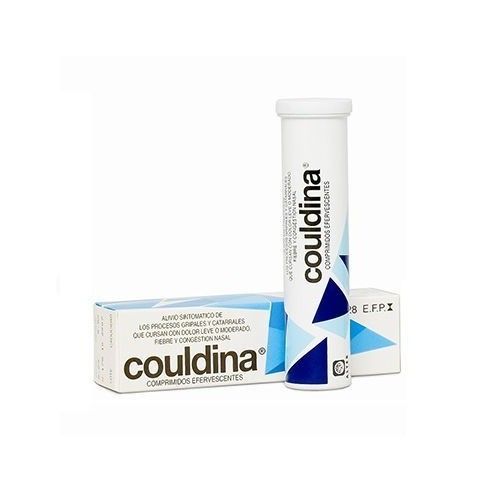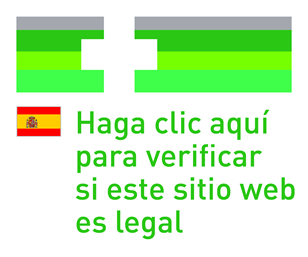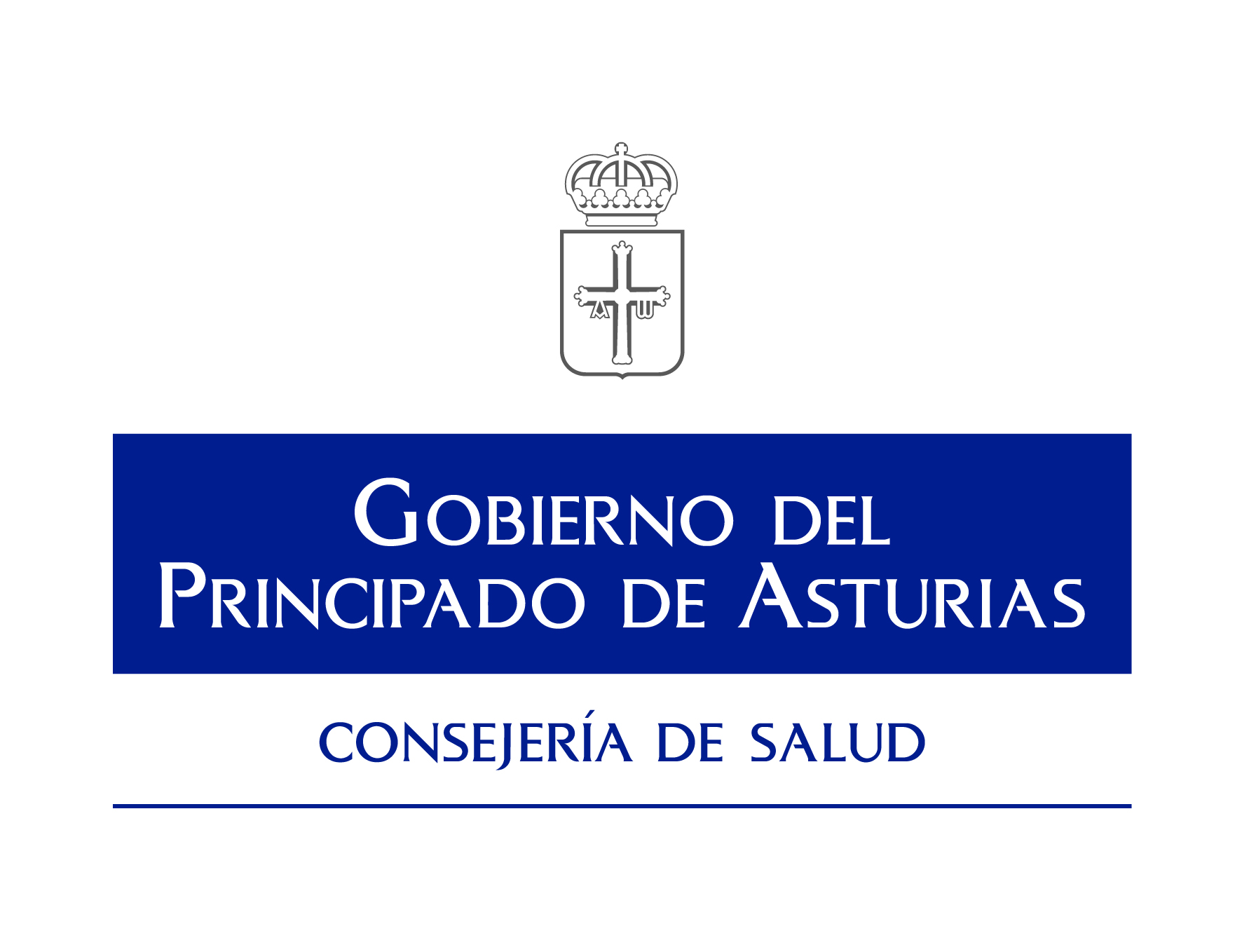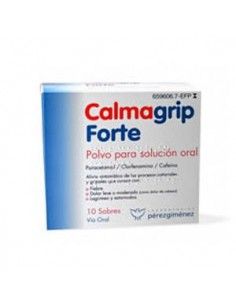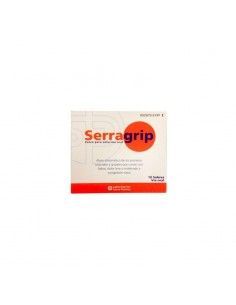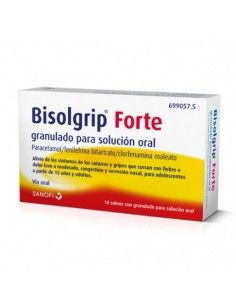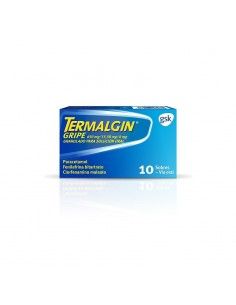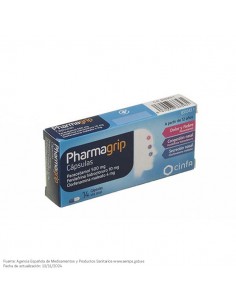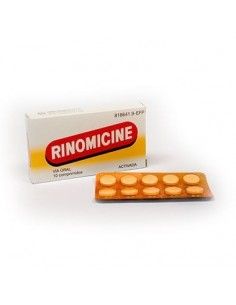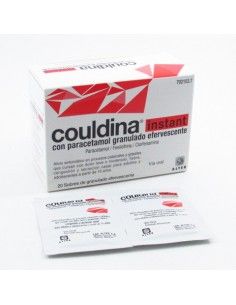1. What is Couldina with Acetylsalicylic Acid and what is it used for?
Couldina with Acetylsalicylic Acid is a combination of acetylsalicylic acid, chlorphenamine and phenylephrine.
Acetylsalicylic acid is an anti-inflammatory that acts on pain and fever.
Chlorphenamine is an antihistamine that relieves runny nose.
Phenylephrine is a sympathomimetic that reduces nasal congestion.
It is indicated in adults and adolescents from 16 years of age for the relief of symptoms of colds and flus with fever, mild to moderate pain, congestion and runny nose.
A doctor should be consulted if fever persists for more than 3 days or pain for more than 5 days or if it gets worse or does not improve.
2. What you need to know before you start taking Couldina with Acetylsalicylic Acid
Do not take Couldina with acetylsalicylic acid:
- If you are allergic to acetylsalicylic acid (aspirin), chlorphenamine maleate, phenylephrine hydrochloride or any of the other ingredients of this medicine (listed in section 6).
- If you have had asthmatic allergic reactions (difficulty breathing, choking, bronchospasm and in some cases coughing or wheezing) when taking anti-inflammatory medicines, aspirin, other painkillers or other allergy medicines because cross-sensitivity may occur.
- If you suffer from gastric ulcer, duodenal ulcer or repeated gastric discomfort.
- If you have suffered from bleeding or perforation of the stomach caused by acetylsalicylic acid or other anti-inflammatory drugs.
- If you suffer from haemophilia or other blood clotting problems.
- If you have or have ever had asthma.
- If you have nasal polyps associated with asthma that are caused or increased by aspirin.
- If you have severe heart disease (severe coronary heart disease or angina pectoris) or severe arterial disease.
- If you have tachycardia (fast heartbeat).
- If you have poorly controlled high blood pressure (hypertension).
- If you have severe kidney or liver disease (severe kidney or liver failure).
- If you have thyroid disease (hyperthyroidism).
- If you are being treated with oral anticoagulant medicines (e.g. Sintrom).
- If you have glaucoma (increased eye pressure).
- If you are taking or have taken less than 15 days before any medicine for depression or Parkinson's disease, which inhibits monoamine oxidase inhibitors (MAOIs) (see section ‘Taking Couldina with other medicines’).
- If you are being treated with beta-blocker medicines (medicines for heart or artery disease) (see section ‘Taking Couldina with other medicines’).
- If the patient is under 16 years of age, as the use of acetylsalicylic acid has been linked to Reye's syndrome, a rare but serious disease that occurs in children under 16 years of age.
- If you have diabetes mellitus.
- If you are in the third trimester of pregnancy.
Warnings and precautions
Do not take more of the medicine than recommended in section 3 ‘How to take Couldina’.
You should not drink alcohol while taking this medicine, as alcohol increases the possibility of gastrointestinal side effects caused by acetylsalicylic acid. In addition, alcohol may cause the chronic irritation caused by acetylsalicylic acid and potentiate the sedative effect caused by chlorphenamine.
If during treatment with this medicine you notice severe or persistent abdominal pain and/or black stools, stop taking this medicine and consult your doctor immediately, because you may have developed bleeding or perforation of the stomach or duodenum. This risk is higher when using high doses and prolonged treatment, in patients who have previously suffered from peptic ulcer and in the elderly.
Consult your doctor or pharmacist before you start taking this medicine:
- If you have bladder neck obstruction or urinary retention, because it may worsen.
- If you have glucose-6-phosphate dehydrogenase deficiency (an inherited disease that causes a type of anaemia).
- If you have or have ever had rhinitis or hives.
- If you have recently undergone or are due to undergo surgery or dental work, including tooth extraction, within the next 7 days.
- If you have controlled high blood pressure.
- If you suffer from pheochromocytoma, cardiovascular diseases such as slow heartbeat, kidney, liver or lung diseases or if you suffer from anaemia.
- If you are being treated with tricyclic antidepressants or medicines with a similar effect and you develop gastrointestinal problems, you should stop taking this medicine and consult a doctor immediately, because paralytic ileus (stopping the normal movement of part of the intestine) may occur.
- If you are taking monoamine oxidase inhibitor (MAOI) medicines for the treatment of depression or Parkinson's disease, you should separate taking Couldine with Acetylsalicylic Acid from taking these medicines for at least 15 days.
Children and adolescents
Children under 16 years of age should not take this medicine, it is contraindicated in them.
Elderly people
Elderly people should not take this medicine without consulting their doctor, as they are more prone to side effects.
Use of Couldina with Acetylsalicylic Acid with other medicines
Tell your doctor or pharmacist if you are taking or have recently taken any other medicines including over-the-counter medicines, homeopathic medicines, herbal medicines and other health-related products as it may be necessary to interrupt the treatment or adjust the dose of any of them.
In particular, if you are using any of the following medicines, it is important that you consult your doctor before taking Couldine with Acetylsalicylic Acid, as it may be necessary to change the dose of some of them or discontinue treatment.
- Analgesics or non-steroidal anti-inflammatory drugs (medicines used to treat pain and/or muscle inflammation, such as Ibuprofen or others) and corticosteroids because simultaneous treatment may cause ulcers, intestinal bleeding and may also decrease the effectiveness of these medicines.
- Anaesthetics (hydrocarbons by inhalation) in case you are going to undergo surgery, you should interrupt the treatment with this medicine a few days before the operation due to the possible risk of arrhythmias.
- Antacids may decrease the effectiveness of Couldina with acetylsalicylic acid.
- Anticoagulants (medicines used to prevent blood clots) such as Sintrom, heparin or warfarin, because they increase the risk of bleeding.
- Antidepressants (medicines used for depression), such as selective serotonin reuptake inhibitors, tricyclic and tetracyclic antidepressants, and monoamine oxidase inhibitors (MAOIs), as the risk of bleeding is increased and a decrease in the effectiveness of some of them or serious side effects may occur. If you are being treated with monoamine oxidase inhibitors (MAOIs) for the treatment of depression or Parkinson's disease, you should separate the intake of Couldina from that of these medicines for at least 15 days, because serious side effects can occur, manifested by severe headache, rise in blood pressure and sudden rise in temperature. If you are taking lithium, you cannot take this medicine because it can increase the amount of lithium in your blood and reach toxic levels.
- Antiepileptic drugs such as phenytoin and valproic acid for decreasing the effectiveness or increasing the side effects of antiepileptic drugs.
- Antihypertensives (medicines to lower blood pressure) because kidney failure and decreased efficacy of the antihypertensive may occur.
- Medicines used to lower blood sugar (oral anti-diabetics, insulins and sulphonylureas) because taking Couldina with acetylsalicylic acid when taking these medicines increases the blood sugar lowering effect and hypoglycaemia may occur.
- Medicines used for the treatment of seizures (such as barbiturates) because taking both medicines together increases the amount of barbiturates in the blood and therefore their adverse effects.
- Cyclosporine and Tacrolimus (used to prevent transplant rejection) because taking Couldine when taking cyclosporine increases the toxicity of cyclosporine to the kidney.
- Cimetidine and ranitidine (used for heartburn) because they increase the adverse effects of Couldina with acetylsalicylic acid.
- Digoxin (heart medicine) Couldina with Acetylsalicylic Acid should not be taken when being treated with these medicines because digoxin can reach toxic levels in the blood.
- Interferon alfa (used for the treatment of certain viral and tumour infections) because it decreases the effectiveness of interferon.
- Methotrexate (used for the treatment of cancer and rheumatoid arthritis) because it increases the toxicity of methotrexate.
- Medicines used for the treatment of gout (probenecid and sulfinpyrazone) because it increases the toxicity of Couldina with Acetylsalicylic Acid and decreases the effectiveness of medicines used for the treatment of gout.
- Medicines used to lower high blood pressure (diuretics and ACE inhibitors).
- Other analgesics or non-steroidal anti-inflammatory drugs (medicines used to treat pain and/or muscle inflammation).
- The antibiotic vancomycin (used to treat infections). Taking Couldina with acetylsalicylic acid when taking vancomycin increases the risk of ototoxicity from vancomycin.
- Zidovudine (used in the treatment of patients infected with the human immunodeficiency virus, HIV, which causes AIDS) because taking Couldina with acetylsalicylic acid while on treatment with Zudovidin decreases the elimination of Zudovidin and therefore increases the risk of its adverse effects.
- Medicines that affect the conduction of the heart such as anti-arrhythmics: taking this medicine when you are being treated with medicines that affect the conduction of the heart should be monitored by your doctor.
- Medicines containing thyroid hormones (used to treat thyroid diseases): taking this medicine when being treated with medicines for thyroid diseases should be monitored by your doctor.
- Medicines used for heart disease or digestive diseases (atropine sulphate) when being treated with these medicines, taking Couldina with Acetylsalicylic Acid leads to decreased efficacy and increased side effects of these medicines.
- Medicines that depress the central nervous system (such as those used for insomnia or anxiety or antihistamines) because symptoms of overdose of these medicines may occur.
- Ototoxic medicines (which have the adverse effect of damaging the ear). When taking Couldina while being treated with medicines that can cause ototoxicity, symptoms of ototoxicity, such as ringing in the ears, dizziness and vertigo, may not be noticeable.
- Photosensitising medicines (which as an adverse effect cause allergy to light) because taking Couldine with Acetylsalicylic Acid with medicines that cause photosensitisation may increase the photosensitising effects of these medicines.
- Nasal decongestants because there is an increase in the adverse effects of CNS stimulation such as nervousness, irritability, insomnia and possible seizures. Increased blood pressure may also occur.
- Caffeine-containing medicines because Couldina with Acetylsalicylic Acid increases the effects of caffeine and its adverse effects.
Tell your doctor or pharmacist if you are taking, have recently taken or may need to take any other medicines.
Interference with laboratory tests:
If you are going to have any analytical tests (including blood tests, urine tests, etc...) tell your doctor that you are taking/using this medicine, as it may alter the results.
Taking Couldina with Acetylsalicylic Acid with food, drinks and alcohol
Take this medicine after meals or with food.
You should not drink alcoholic beverages while you are taking this medicine because it may increase the side effects of this medicine.
If you regularly consume alcohol (3 or more alcoholic drinks - beer, wine, liqueur... - a day), taking Couldina with acetylsalicylic acid may cause stomach bleeding.
Pregnancy and breast-feeding
If you are pregnant or breast-feeding, or think you may be pregnant or intend to become pregnant, consult your doctor or pharmacist before taking this medicine.
This medicine is contraindicated during the third trimester of pregnancy.
It should also not be taken during the rest of the pregnancy unless your doctor considers it strictly necessary.
This medicine must not be used during breast-feeding, because it may have adverse effects on the baby.
Driving and using machines
This medicine may cause drowsiness, impairing mental or physical capacity. If you notice these effects, avoid driving or using machines.
Couldina with acetylsalicylic acid contains sodium:
This medicine contains 410 mg of sodium (the main component of table/cooking salt) in each tablet. This is 21% of the maximum recommended daily intake of sodium for an adult.
Consult your doctor or pharmacist if you need 1 or more tablets daily for a prolonged period especially if you have been advised to follow a low salt (sodium) diet.3. How to take Couldina with Acetylsalicylic Acid
Follow the instructions for taking the medicine exactly as described in this leaflet or as directed by your doctor or pharmacist. If you are in any doubt, ask your doctor or pharmacist.
The recommended dose is:
Adults and adolescents from 16 years of age:
Take 1 tablet every 8 hours. If necessary, it can be taken every 6 hours (3 or 4 times in 24 hours).
In any case, do not take more than 4 tablets in 24 hours, and leave at least 6 hours between each dose.
Use in patients with reduced liver, kidney or heart functions
These patients should not take this medicine without consulting their doctor as the dose should be reduced.
Use in children
This medicine is contraindicated in children under 16 years of age.
Use in the elderly
Elderly people should not use this medicine without consulting a doctor, because they may be particularly affected by some side effects of the medicine such as slow heartbeat (bradycardia) or reduced cardiac output, due to the phenylephrine and chlorphenamine content. They are also more likely to experience adverse effects such as sedation, confusion, hypotension or excitement, and may be more sensitive to effects such as dry mouth and urinary retention.
How to take
Take Couldina with Acetylsalicylic Acid after meals or with food or milk (especially if digestive discomfort is noted).
Do not take on an empty stomach.
This medicine is taken by mouth.
Dissolve the tablet in a small amount of liquid, preferably half a glass of water, and wait until the bubbling or fizzing has completely disappeared and then drink.
Always use the lowest effective dose.
The administration of this medicine is subject to the appearance of all symptoms, pain or fever, congestion and runny nose. As these disappear, treatment should be discontinued.
If fever persists for more than 3 days of treatment, pain or other symptoms for more than 5 days, or worsens or new symptoms appear, you should consult your doctor.
If you take more Couldina with Acetylsalicylic Acid than you should
The main symptoms of overdose are: headache, dizziness, ringing in the ears, blurred vision, drowsiness, sweating, rapid breathing, low or high blood pressure, altered pulse (cardiac arrhythmias), nervousness, hallucinations, confusion, nausea, vomiting and occasionally diarrhoea.
In case of overdose or accidental ingestion, consult your doctor or pharmacist immediately or go to a medical centre immediately or call the Toxicological Information Service, telephone: 91 562 04 20, indicating the medicine and the quantity taken.
4. Possible side effects
Like all medicines, Couldine with Acetylsalicylic Acid can cause side effects, although not everybody gets them.
The following adverse effects have been reported during the period of use of acetylsalicylic acid, phenylephrine, chlorphenamine, and vitamin C, the frequency of which has not been established with certainty:
- The adverse effects that may occur most frequently are:
Slight drowsiness, dizziness, muscle weakness, these adverse effects may disappear after 2-3 days of treatment. Difficulty in facial movements, clumsiness, tremor, alterations in sensations and tingling, dry mouth, nose and throat, loss of appetite, alterations in taste or smell, gastrointestinal discomfort (which may decrease if the medicine is administered together with food), nausea, vomiting, diarrhoea, constipation, stomach pain, thickening of mucus, sweating, blurred vision or other visual disturbances, gastric ulcer, duodenal ulcer, gastrointestinal bleeding. Hypoprothrombinemia (impaired clotting) when high doses are taken.
- Infrequent (rare) side effects may occur:
Reye's syndrome in children under 16 years of age with febrile processes, influenza or chicken pox (see section ‘What you need to know before you start taking Couldine with Acetylsalicylic Acid’). Liver disorders, especially in patients with juvenile arthritis. Confusion (especially in elderly patients), euphoria, nervousness, restlessness (especially in children and elderly patients), insomnia, headache, strange behaviour; pulse disturbances (palpitations, tachycardia), elevation of blood pressure (hypertension), which can sometimes be severe (hypertensive crisis). Difficulty urinating. anaemia.
- Adverse effects that may occur very infrequently (very rare) are: Chronic post-hemorrhagic anaemias/iron deficiency (due to occult bleeding) presenting typical symptoms such as tiredness and pallor. Cerebral haemorrhage especially in patients with uncontrolled hypertension and taking anticoagulant drugs at the same time. Anaphylactic shock and hyperglycaemia (increased blood sugar).
If taken over a long period of time: dizziness, ringing in the ears, deafness, sweating, headache, confusion, kidney failure and acute interstitial nephritis (inflammation of the kidneys).
If you notice the appearance of:
- Upset or painful stomach, gastric or intestinal bleeding or black stools.
- Skin disorders such as rash or redness.
- Difficulty breathing.
- Sudden change in the amount or appearance of urine.
- Swelling of the face, feet or legs.
- Deafness, ringing in the ears or dizziness.
Stop taking the medicine and consult your doctor immediately, as this may indicate the occurrence of side effects that need urgent medical attention.
If you experience side effects, consult your doctor or pharmacist even if they do not appear in this leaflet.
5. Storage of Couldina with acetylsalicylic acid
Keep out of the sight and reach of children.
Do not store above 25°C.
Keep container tightly closed. Keep in the original container.
Do not use this medicine after the expiry date which is stated on the pack after EXP. The expiry date is the last day of the month indicated.
Medicines should not be flushed down the drain or thrown away. Please dispose of unneeded medicines and containers at the SIGRE Point (or any other medicine waste collection system) at the pharmacy. If in doubt, ask your pharmacist how to dispose of unneeded medicine containers and medicines. In this way, you will help to protect the environment.
6. Package contents and additional information
Composition of Couldina with acetylsalicylic acid effervescent tablets
- The active ingredients are: acetylsalicylic acid, chlorphenamine maleate, phenylephrine hydrochloride. Each tablet contains 500 mg acetylsalicylic acid, 2 mg chlorphenamine maleate and 7.5 mg phenylephrine hydrochloride.
- The other ingredients (excipients) are: citric acid anhydrous (E-330), sodium hydrogencarbonate (E-500ii), sodium carbonate anhydrous (E-500i), sodium citrate (E-331), mannitol (E-421), povidone K 30 (E-1201), glycine (E-640), docusate sodium and saccharin sodium (E-954ii).
Appearance of the product and contents of the container
This medicinal product is presented in the form of effervescent, flat cylindrical tablets, bright white in colour, packed in aluminium tubes coated with an epoxy paint layer, closed by a polyethylene cap containing silica gel, in packs of 20 tablets.
Marketing authorisation holder and responsible for manufacture
LABORATORIOS ALTER, S.A.
Mateo Inurria, 30
28036 MADRID

